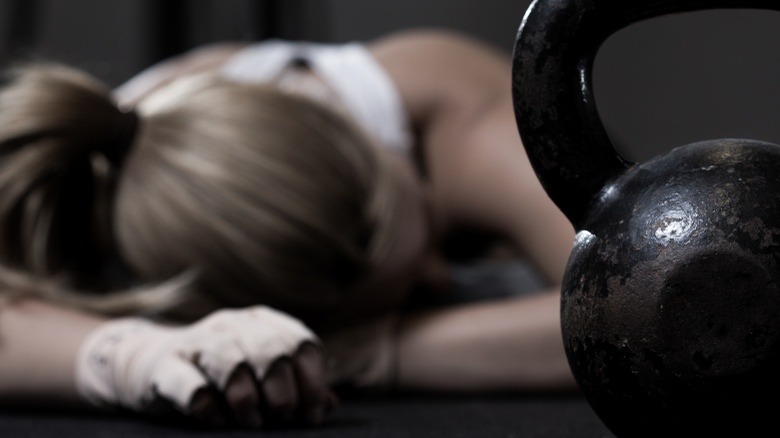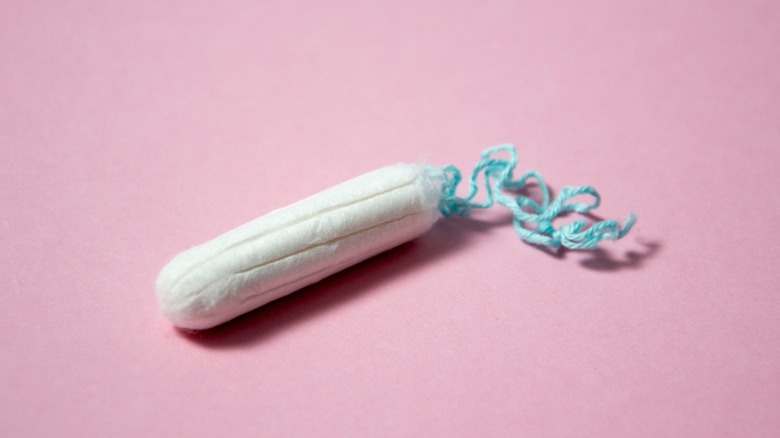What Really Happens To Your Body When You Exercise Too Much
There's no question that exercise is a good thing, but just like it's important to make sure you're exercising enough, it is possible to exercise too much. When you do, a lot of different things happen in your body. A regular workout routine can help control weight, keep your health in check, improve your mood, boost your energy, help you sleep, and even rev up your love life (major bonus, right?). But still, it's possible to have too much of anything, even something as fabulous and necessary as exercise.
How much exercise do you need?
In order to maintain your general health, most adults should aim to squeeze in 150 minutes of moderate aerobic exercise or 75 minutes of vigorous aerobic activity each week. It's not easy to keep track of how much you're exercising in a week's time (we've got more important things to keep track of, I know), but aim for about 30 minutes a day, five days a week to keep things in check — more if you're trying to lose weight. If you're doing high intensity exercises, limit yourself to no more than three times per week.
How much exercise you need (and how much is too much) is different for everyone, but I talked with some trainers and medical professionals to find out what signs will tell you that you may be overdoing it.
Dehydration
Depending on the intensity of your workout, you could be losing as much as one to three quarts of water for every hour you exercise, and according to celebrity fitness trainer Autumn Calabrese, that can get dangerous. "Dehydration is associated with over-exercising. You sweat a lot when working out a great deal, causing water and electrolytes to leave the body. Our bodies need water to be replenished to keep functioning at proper levels," she said.
In order to keep dehydration at bay, drink plenty of water both before and during your exercise, and end your workout early if you start experiencing symptoms like dizziness, vomiting, nausea, headaches, and muscle cramps.
Performance plateau
If you're pushing yourself at the gym in order to reach certain fitness goals, you may actually be working against yourself. Dr. Brian Grawe, an orthopedic surgeon at the University of Cincinnati, says this situation is actually pretty common. "Some people can actually exercise too much," he said. "By over-training our bodies, eventually our athletic performance will plateau or even decline." These plateaus can effect your fitness levels or weight loss goals, and they happen when your body starts to burn out.
Tyler Spraul, a certified strength and conditioning specialist and head trainer at Exercise.com, agrees. "When you exercise too much, your body will eventually start to grow weaker and continually break down, instead of recovering and growing stronger as you would expect to happen when following a good training program," he said. "Basically, your body is going to find ways to make you take a break." Shorten your workouts, or maybe just take a break for a few days, to give your body a chance to rest.
Celebrity fitness trainer Autumn Calabrese adds that exercising too much can even cause you to lose the muscles you've already built, saying, "Over-exercise prevents your body from building muscle, leading to lean muscle loss."
Disrupted sleep patterns
You would think that after a few days of hitting it hard at the gym, you'd fall to sleep the second your head hits the pillow at night. That's not always the case, according to certified personal trainer Ainslie MacEachran, who says, "Sleep patterns become disrupted because hormonal levels are negatively influenced." Basically, that constant state of overload means your body will have a hard time winding down when it's finally to sleep.
Mood changes
All those crazy mood swings may not be hormonal after all. If you've been exercising more than you should, chances are, you're tired — probably mentally and physically. That exhaustion tends to make us cranky, and it can lead to mood changes like depression, anger, irritability and anxiety. Cool down your gym routine and your attitude may start to balance out as well.
Decreased appetites
Having a decreased appetite may sound like a good thing, but it's not — especially if your body needs the energy to help recover from exercise. Athletes and those who do high endurance training tend to suffer from appetite suppression for a combined number of reasons. During short bursts of exercise, the hormone and adrenaline rushes that stave of hunger aren't an issue, but when you put your exercise routine into overdrive, that loss of hunger might stick around more long-term. Loss of appetite has also been attributed to muscle and tissue damage sustained from intense workouts and your body's reaction to those energies.
Kidney damage
Exercising too much doesn't affect only your muscles. It can have an affect on your kidneys, too. "Rhabdomyolysis is a little-known and rarely discussed condition in which the energy supplies in the body are depleted and then, through a series of cellular processes, muscle breakdown occurs and leads to potential kidney damage," said Phillip J. Adler, and manager of Spectrum Health Orthopedic & Sports Medicine Programs. "If you continue to damage the muscles to a point that is detrimental and you don't allow them to heal, you have the potential to build up CK levels in your blood that can lead to kidney problems. So if you frequently over-exercise and push your body beyond recoverable limits, you run the risk of rhabdo."
Adler said warning signs for rhabdo include darkened urine (like dark soda), muscle pain, weakness, stiffness, or cramping. He explained that the condition is often confused with heat stroke because of its similar symptoms.
He lists CrossFit and similar high-intensity workouts as a good example of exercise that may make you susceptible to rhabdo. "This is intense physical activity that pushes the body to its physical limits on a regular basis. The activity itself may not be harmful, but what is harmful is not allowing your body to recover because you feel like you need to continue to do more. Just like dosing limitations on over-the-counter medications, this is a situation where more is not always better. Some may be helpful, but too much could kill you."
Heart strain
We've been told over and over again that one of the best ways to have a healthy heart is to exercise regularly. So it's pretty distressing that exercising too much can actually work in the reverse, according to celebrity trainer Jay Cardiello. "You can strain your heart. It is a muscle and if strained it would weaken, which can lead to heart failure," he said. One 2011 study proved just that, concluding that intensive training can lead to structural changes and scarring of the heart. There's no question that exercise is still great for your heart, but don't take it to the extreme.
And there are other ways over-exercising can put your heart at risk. "High levels of intense exercise can be toxic to your heart because exercising for too long and too hard can potentially lead to irregular heartbeats. The danger of an abnormal heartbeat can lead to serious heart-related complications including blood clots and stroke," said Dr. Partha Nandi, host of the national syndicated television show Ask Dr. Nandi and health editor at the ABC affiliate in Detroit. "This applies to those athletes logging many hours of intense training and endurance."
Missing periods
Missing your period may sound like a blessing in disguise, but it may also be a sign that you've been over-exercising. "Women can experience amenorrhea if they over-exercise. This is the loss of their period and is due to extremely low body fat," said celebrity fitness trainer Autumn Calabrese.
This usually happens because the combination of intense exercise and low body fat cause the body to enter "starvation mode," where it turns off all functions that are not necessary to survival — including the reproductive system. It also happens because the hormones released during exercise interfere with reproductive hormones, essentially throwing your system out of whack.
Unfortunately, though the break from your period may be appreciated, it can have longterm repercussions. Since your body is without estrogen while your reproductive system is in shut-down mode, it can leave you open to issues down the road like osteoporosis, infertility, and atrophy of the breasts and vagina.
Weakened immune systems
You may be exercising for your health, but too much of it can keep you in the sick ward. "Your immune system weakens, making you more susceptible to infection and illness," said Cardiello. Moderate exercise may help boost your immune system, but too much can do just the opposite.
So the moral of the story is that it is possible to get to much of a good thing, and exercise is a great example. There's no question that you should still strive to be physically active, but talk to your doctor about what limits you should set, and look out for signs that you might be overdoing it.










